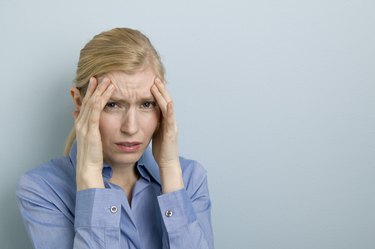
Undernutrition, malnutrition and starvation can lead to many physical symptoms and often go hand in hand with psychiatric disorders including anorexia nervosa and depression. Low-calorie diets, lack of access to food and disorders that prevent the absorption of nutrients are all possible causes of not eating enough; but to induce hallucinations, other factors must also come into play.
Undernutrition
Video of the Day
Lack of food causes deficiencies in calories, vitamins and minerals, causing the body to first burn through fat reserves to provide fuel. After fat stores are used, the body may break down other tissues like muscles or internal organs, including the brain. In developed countries, undernutrition is most common in older people or those consuming too much alcohol, according to "The Merck Manual Home Health Handbook."
Video of the Day
Hallucination
Hallucinations, or the perception of something as real that was actually created by the mind, can include all of the senses, from seeing things that are not truly there to smelling, hearing or feeling things that do not exist Some hallucinations are not cause for concern. For instance, when a loved one dies, you may think you see her or hear her speaking; this can be part of the grieving process. However, most hallucinations are the result of a chemical imbalance in the body. Drugs and alcohol, lack of sleep, fever, dementia, schizophrenia and severe illness are common causes.
Symptoms
Undernutrition, or lack of food, does not normally lead to hallucinations. Symptoms of undernutrition include a reduction in body fat, sunken eyes, sparse and dry hair that falls out easily, fatigue, diarrhea, inability to stay warm, irritability, apathy and possibly stupor. The state of stupor, a condition in which the mind is in a daze of numbness, is another possible symptom of undernutrition. Additionally, lack of food can eventually lead to a weakening of the immune system, resulting in illnesses.
Other Links
Other links between hallucinations and lack of food include a state of delirium that can result from electrolyte disturbances possibly caused by inadequate nutrition. Delirium can result in changes in alertness, feelings and perceptions. The use of drugs, such as amphetamines, reduces appetite as well as interfering with the proper absorption of nutrients while also preventing adequate sleep, all factors that can contribute to hallucinations. Liver and kidney disorders are also a direct result of lack of food, as well as common causes of hallucinations. And depression can be caused by undernutrition, leading to hallucinations if mixed with psychosis as well.
Warning
Any detachment from reality, no matter how brief, is cause for immediate medical attention. If someone seems to be hallucinating, do not leave him alone as he may become extremely nervous, frightened or paranoid. Call 911 or see that he gets to the nearest emergency room.